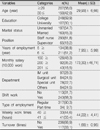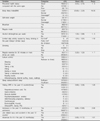Abstract
Purpose
The purpose of this study was to investigate the relationships among psycho-social well-being, and health perception and behavior in clinical nurses.
Methods
The data were collected from 362 nurses employed at five general hospitals. A self-reported questionnaire was used to assess demographics and job characteristics, health perception and behavior, depression, and psycho-social stress. The data were analysed using Cronbach's alpha, descriptive statistics, t-test, and ANOVA.
Results
While nurses perceived themselves to be in good health, represented by a high mean for health perceptions, actual health behavior was poor as the mean for health behavior was low. Forty two percents of the subjects were categorized as having major depression and high-stress levels. There were statistically significant differences in psycho-social well-being according to age, marital status, years of employment, and monthly salary. Also, there were significant differences in psycho-social well-being according to health perception, regular meals and exercise, sufficient sleep, job related injury and accident, and absences for ill.
Figures and Tables
References
1. Beşer A, Bahar Z, Büyükkaya D. Health promoting behaviors and factors related to lifestyle among Turkish workers and occupational health nurses' responsibilities in their health promoting activities. Ind Health. 2007. 45:151–159.

2. Chang SJ, Kang DM, Kang MK, Koh SB, Kim SA, Kim SY, et al. The development and standization of the Korean job stress scale (Research Report No. 2004-56-427). 2004. Occupational Safety & Health Research Institute at Bucheon.
3. Cho J, Kim J, Chang S, Fiedler N, Koh S, Crabtree BF, Kang D, Kim Y, Choi Y. Occupational stress and depression in Korean employees. Int Arch Occup Environ Health. 2008. 82:47–57.

4. Chung EC. Job stress, self-efficacy and health promoting behaviors in hospital nurses. J Korean Acad Psychiatr Ment Health Nurs. 2002. 11(3):398–405.
5. Chun KK, Kwon KD, Kim SG. The revision of the Korean CES-D: I. J Soc Sci Res. 1999. 6(1):429–451.
6. Eaton WW, Muntaner C, Bovasso G, Smith C. Socioeconomic status and depressive syndrome: the role of inter and intra generational mobility, government assistance, and work environment. J Health Soc Behav. 2001. 42(3):277–294.

7. Feskanich D, Hastrup JL, Marshall JR, Colditz GA, Stampfer MJ, Willett WC, Kawachi I. Stress and suicide in the nurses' health study. J Epidemiol Community Health. 2002. 56(2):95–98.

8. Han KS, Kim JH, Lee KM, Park JS. Correlation between quality of life and health promoting behaviors among hospital staff nurses. J Korean Acad Psychiatr Ment Health Nurs. 2004. 13(4):430–437.
9. Iacovides A, Fountoulakis KN, Kaprinis G. The relationship between job stress, burnout and clinical depression. J Affect Disord. 2003. 75:209–221.

10. Jun KY, Lee HJ, Lee YI, Kim JI, Kim YG. The effects of job stress for depression in clinical nurses. Korean J Occup Health Nurs. 2007. 16(2):158–167.
11. Kavari SH. A study of depression prevalence in nurses and it's effect in Shiraz Namazi hospital. Middle East J Fam Med. 2006. 4(3):17–21.
12. Kim AJ, Kim OS, Baik S, Jang J, Kim JH. Stress, depression and Health risk behaviors in Korean elders. J Korean Acad Community Health Nurs. 2007. 18(3):391–399.
13. Kim EJ, Park JS. Comparison of health problems, conditions, & health promoting behavior and risky environment among various industrial workers. Korean J Occup Health Nurs. 2009. 18(1):71–83.
14. Kim HC, Kwon KS, Koh DH, Leem JH, Park SG, Shin JY, Lee YC, Kim YK. The relationship between job stress and psychosocial stress among nurses at a university hospital. Korean J Occup Environ Med. 2006. 18(1):25–34.

15. Kim JH. Job stress management and nurses' role: A educational and industrial collaboration. In paper presented at the winter meeting of the Korean Academic Society of Occupational Health Nursing. 2001. 12. Chonan.
16. Kim JH, Park SA. The relationship between coping strategies and a nursing organizational effectiveness in staff nurses. J Korean Acad Nurs Adm. 2002. 8(1):97–105.
17. Kim MD. Prevalence of depressive symptoms and its correlates. J Med Life Sci. 2009. 6(1):57–63.
18. Kim MS. A study on the relationship between job stress and health promoting behavior among university hospital nurses. Korean J Occup Health Nurs. 2001. 10(2):153–163.
19. Kim SS. A study of the drinking behavior is caused by job stress-focused on coping strategies as buffering effects. 1997. Seoul: Yonsei University;Unpublished master's thesis.
20. Kim YJ, Lee KH. Factors influencing related health promoting behavior in hospital nurses. J Korean Public Health Assoc. 1999. 25(2):51–64.
21. Lee MK, Lee MS, Park KO. Factors affecting on hospital workers' stress symptom. Korean J Occup Environ Med. 1997. 9(1):61–74.

22. Lee Y, Jung M. Presenteeism and absenteeism according to health problems on nurses. J Korean Acad Community Health Nurs. 2008. 19(3):459–468.
23. Park JS, Kim JH. Measuring job stress. 2004. Seoul: KoreaMed Co.
24. Ratner PA, Sawatzky R. Health status, preventive behaviour and risk factors among female nurses. Health Rep. 2009. 20(3):53–61.
25. Shields M, Wilkins K. Finding from the 2005 National Survey of the Work and Health of Nurses (catalogue 83-003-XPE). 2006. Ottawa: Minister of Industry.
26. Seo JS. Relationship between health perception and health status of clinical nurses. Korean J Rehabil Nurs. 2002. 5(1):71–85.
28. Yoon H, Cho Y. Relationship between job stress contents, psychosocial factors and mental health status among university hospital nurses in Korea. J Prev Med Public Health. 2007. 40(5):351–362.

29. Yoon SH, Bae JY, Lee SW, An KE, Kim SE. The effects of jos stress on depression, drinking and somoking among Korean Men. Health Soc Sci. 2006. 19:31–50.
30. World Health Organization. Obesity and overweight. 2009. Retrieved from http://www.who.int/dietphysicalactivity/media/en/gsfs_obesity.pdf.




 PDF
PDF ePub
ePub Citation
Citation Print
Print







 XML Download
XML Download